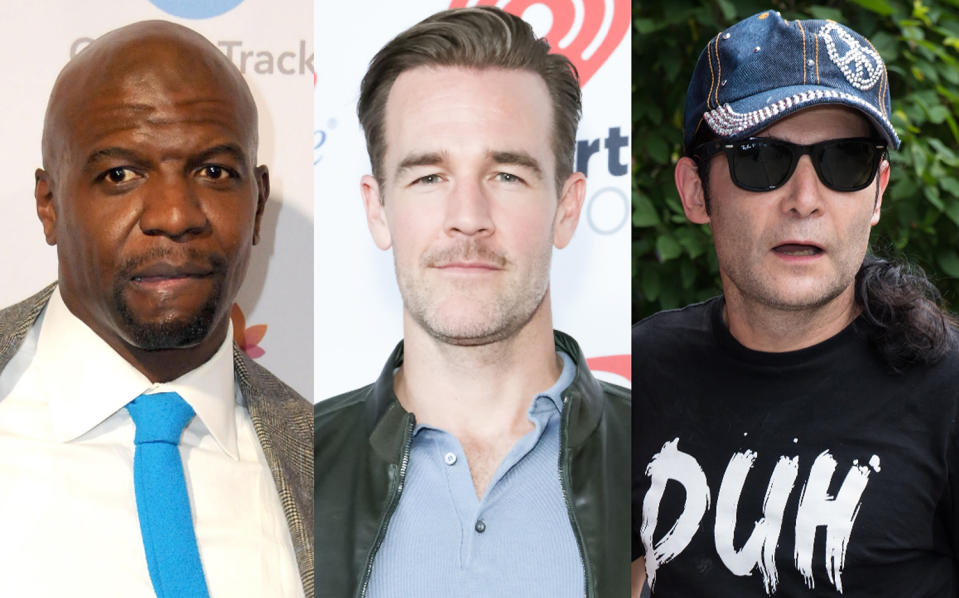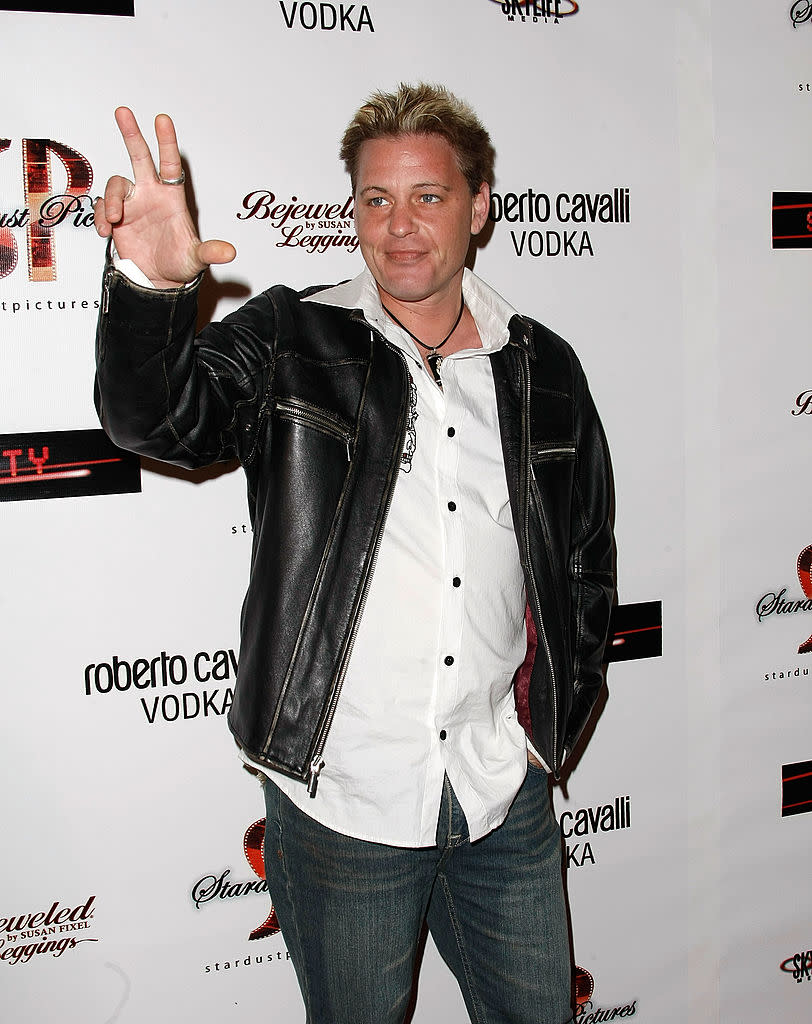Why it's also hard for Hollywood's men to talk about being sexually assaulted
The Harvey Weinstein scandal has opened up a dialogue of epic proportions surrounding issues of sexual assault and harassment, with numerous women in Hollywood speaking up to tell their stories. They’ve been joined by a small chorus of men who shared that they, too, had been victims of sexual assault and harassment, perpetrated by men of power in the industry.

The discussion began with Terry Crews, when the actor and former NFL star took to Twitter to share how the Weinstein news was giving him PTSD. Why? “My wife n I were at a Hollywood function last year n a high level Hollywood executive came over 2 me and groped my privates,” Crews explained in a series of tweets.
This whole thing with Harvey Weinstein is giving me PTSD. Why? Because this kind of thing happened to ME. (1/Cont.)
— terrycrews (@terrycrews) October 10, 2017
He went on to describe how he jumped and asked the exec what he was doing, while the exec just smiled at him. And while Crews wanted to hit him, he refrained, knowing he’d be thrown in jail. “He called me the next day with an apology but never explained why he did what he did,” Crews tweeted, adding, “I decided not 2 take it further becuz I didn’t want 2b ostracized— par 4 the course when the predator has power n influence.” He also said he understood why women “let it go.”
.@terrycrews is here showing that it’s important to know that it’s not only women that are victims of sexual harassment, and it is OK for men to speak out about their abuse too, no matter how big and muscular you are. pic.twitter.com/QKEDWRxDan
— steph jaqueline (@stephjkd) October 11, 2017
Crews’s admission was followed by actor James Van Der Beek, who also shared his story on Twitter. After commending the women who were coming forward to share their stories, he tweeted, “I’ve had my ass grabbed by older, powerful men, I’ve had them corner me in inappropriate sexual conversations when I was much younger … I understand the shame, powerlessness & inability to blow the whistle. There’s a power dynamic that feels impossible to overcome.”
I’ve had my ass grabbed by older, powerful men, I’ve had them corner me in inappropriate sexual conversations when I was much younger…
— James Van Der Beek (@vanderjames) October 12, 2017
I understand the unwarranted shame, powerlessness & inability to blow the whistle. There’s a power dynamic that feels impossible to overcome
— James Van Der Beek (@vanderjames) October 12, 2017
Rob Schneider also talked about his experience with sexual assault. He told TMZ he was harassed early on in his career by a famous director when they were in a hotel room together. “He comes out in a bathrobe and sits in this chair. The next thing I know, he’s asking me to crawl on the ground and to crawl to him. Then it was just this disgusting feeling,” he said. The director in question, whom Schneider didn’t name, has since died.
Actor Todd Bridges talked about being assaulted by his publicist when he was just 11 years old. In the documentary movie An Open Secret, detailing rampant issues of pedophilia in Hollywood, Bridges talked about asking to be written out of an episode of Diff’rent Strokes that dealt with the issue “because I had myself gone through that, and watching it happen on the show it was like reliving that all over again.”
And then there’s Corey Feldman, who blew the lid off the issue while doing press rounds for his memoir, Coreyography, back in 2013 — and was met with great resistance while doing so. Feldman spoke honestly about having been molested during his early years acting in Hollywood and said that his best friend, the late Corey Haim, had been raped by a Hollywood predator at age 11.
Feldman spoke about his and Haim’s issues with assault with the Hollywood Reporter in 2016.

“He had more direct abuse than I did,” Feldman said. “With me, there were some molestations, and it did come from several hands, so to speak, but with Corey, his was direct rape, whereas mine was not actual rape. And his also occurred when he was 11. My son is 11 now, and I can’t even begin to fathom the idea of something like that happening to him. It would destroy his whole being. As I look at my son, a sweet, innocent, 11-year-old boy and then try to put him in Corey Haim’s shoes, I go, ‘Oh, my God — well of course he was erratic and not well-behaved on sets and things like that.’ What more could we expect of him really? Everybody deals with things differently.”
As this dam slowly begins to break, it appears that more Hollywood men than we know have also suffered from sexual assault and harassment. So why haven’t we heard more about this? Why aren’t they talking about it, too?
“In terms of male sexual trauma, we’re a good generation behind in terms of public awareness, acknowledgement, and building support services,” says Rick Goodwin, a training consultant for 1in6, an organization focused on building programs and support for male victims of sexual assault. “It was after the second wave of feminism when rape crisis centers were built, so we’ve grabbed onto the coattails of that movement. But it’s been a generation to a generation and a half since then, and we’re still breaking ground on what we can do as a community to build places of healing for men. A lot of sexual assault centers are focused on women, some are for people of all genders, but we still have a lot of work to make that happen so men have a place to turn to for recovery and healing.”
Goodwin says that men go through a similar trauma response to sexual assault as women do, but the expression of that trauma is different, often because of what society considers the conventions of masculinity. “In one research study I was involved in, the average age of men seeking treatment for trauma was 45, and this was a study of sexual abuse of boys starting around age 9 or 10,” Goodwin notes. “It took an average of 3 1/2 decades for men to seek treatment, and that was only in areas that have a dedicated treatment center. The age could be higher in towns that don’t have that kind of support.”
Plus, Goodwin says, there’s that unspoken code of what it means to be a man.
“The code word for masculinity is invulnerability — that to be a guy in that conventional sense in the Western world, the core elements of that is in the language we use about the rugged individual who sucks up any pain or vulnerability they may have. Conventional masculinity teaches us that. So that’s why men don’t approach services for help. Men are concerned for their role or status around other men. Everyone wants to be the alpha man. Victimization suggests you’re not that.”
It’s a sentiment echoed by Wendell Moss of the Allender Center at the Seattle School of Theology and Psychology, which trains therapists in handling sexual abuse and trauma patients and in treating men who have been sexually assaulted. Oftentimes, Moss says, men feel great shame in telling other men what happened because of how they’ll be perceived.
“Shame and contempt, specifically, are often the major proponents that stop men from speaking up,” Moss explains. “There’s shame to tell other men, shame that I have been taken advantage of, and what will you do with me? How will you see me? Will you consider me as weak if I was not able to prevent harm from happening to me? Will I be safe, or seen as helpless? And with contempt, they’re often angry at themselves because they couldn’t prevent what happened to themselves. So they’ll either isolate or never tell the story.”
Moss believes the pressure can be big for men in the public eye, because they tend to have a specific image and are held up to be models of strength. As Moss puts it, “People look to them as role models of strength and courage… they model what the public wants to become. So when one of them comes forward with story of abuse, all of a sudden, you mess with that image. And the celebrity is now in the position of saying, ‘You may see me now, but I know part of my life where I have not been this — are you willing to hear that?’”
If Crews and his peers’ stories are any indication, people are now listening. Moss thinks Crews has helped to shift some of the outdated perceptions that surround the concept of masculinity and the incorrect notion that male sexual assault victims are weak (“Terry is a beast,” Moss says with admiration). The more we can shift toxic masculinity, the more hope there is to create a new definition of what it means to be a man — and the more that new definition takes hold, the more men can heal.
And that’s what both Moss and Goodwin want to get across to male victims of sexual assault, whether they’re famous or not: They can heal, and they don’t have to let the outside world tell them what does or doesn’t make them men. Goodwin points out that 1 in 6, so named because statistics say 1 in 6 men will experience sexual assault in their lifetime, offers online group support sessions that allow men to participate anonymously from anywhere in the world. “One of the participants of our online sessions was stationed at a military base in the Middle East, and he would get up at 3 a.m. to join us,” Goodwin says. “Online sessions are a way we can ensure that no matter where you live, you have access to this essential education and support without having to out yourself.”
But Moss says another way to break the taboo of men coming forward is for more famous men to stand up and be brave in sharing their story. “For people like Terry Crews to model that courageousness and show it in the public eye is awesomely needed,” Moss notes. “And in that, you’ll see men watch how you respond to them. When they see people say, ‘I have compassion toward Terry Crews,’ they’ll also think, ‘Maybe there is space to talk and not have to hold this to myself.’ To have that space is huge.”
Both Moss and Goodwin feel it’s important to create arenas where men can share stories of being assaulted without feeling shamed, even if complex dynamics and abuses of power are at play. Because the more men keep silent about assault, the more abuse culture perpetuates.
Or, as Goodwin puts it, “Staying in your silence doesn’t mean it goes away.”
Read more from Yahoo Lifestyle:
Kristen Stewart ‘saved makeup artists’ from sexual misconduct on movie sets
Niecy Nash, Cicely Tyson, and other actresses recall being sexualized as early as age 5
Follow us on Instagram, Facebook, and Twitter for nonstop inspiration delivered fresh to your feed, every day.



